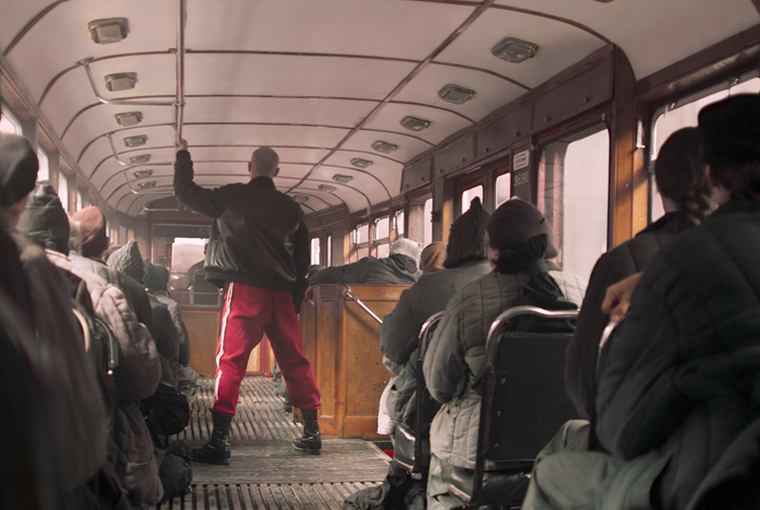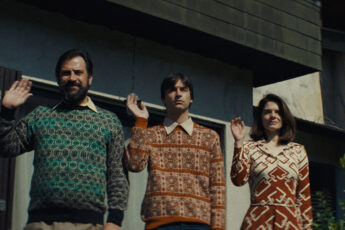Survival of the Fittest
Natasha Merkulova and Aleksey Chupov’s Captain Volkonogov Escaped (Kapitan Volkonogov bezhal, 2021)
Vol. 129 (November 2022) by Colette de Castro
Captain Volkonogov Escaped descends on Leningrad at the height of what has become known as the Great Terror – the arrest and execution of hundreds of thousands of citizens of the USSR at the hands of Stalin’s regime from 1936 through 1938. Yet in the eyes of the forceful writer-and-director duo Natasha Merkulova and Aleksey Chupov, their piece is not a historical film, but what they call a “retro-utopia”. In a revealing Q&A,1 they explain this idea and the artistic choices that flow from it, notably the placement of graffiti in a scene of the film, when no such thing existed in that place. The graffiti is based on constructivist art and is what they imagine graffiti in 1938 Leningrad might have looked like. They wanted to tie the film in with an artistic movement dear to their hearts. This appreciation of the constructivists will come as no surprise for viewers who have seen the pair’s previous work. Their 2018 film, The Man Who Surprised Everyone, has a similar deadpan approach to violence as Captain Volkonogov Escaped; the most appalling scenes don’t protrude from the plot of the film but are just building blocks to the edifice of its own making. Similarly, some sequences in Volkonogov Escaped appear to be driven by its aesthetics rather than narrative exigency. Stylistically, their new film is even more forcible than the last, with notable production design and fantastic acting.
Captain Fyodor Volkonogov (Yuri Borisov) is a young member of the NKVD – The People’s Commissariat for Internal Affairs. The commissariat was the main body responsible for the arrests that took place during this terrifying period of Soviet history, which were driven by quotas as opposed to actual evidence.2 When the viewer first encounters Volkonogov, he cuts a striking figure striding in his black and red uniform through the main offices of the NKVD. Just another cog in the system, he seems happy enough to receive respect for his work without questioning what that work actually consists of. That is until he sees a colleague’s body splattered on the pavement and then frightened comrades quickly dragging the body away. Fearful that his time is fast approaching, he makes a run for it that very afternoon, an act which puts his and all his colleagues’ and acquaintances’ lives in danger.
The film never tries to turn the main character into a hero. The following quote from Robert Conquest’s famed account of the era, published in 1968, puts the Captain’s instinct to flee into context:3
Many NKVD interrogators were often aware of the complete falsehood of the charges, and some of them would even admit it. Most, however, even though not crediting the full details, “professed to believe that they contained a grain of truth and this sufficed to justify their actions in their own eyes.” This applied particularly to the earlier generation of NKVD men. After they themselves were liquidated, the newer intake were much simpler Stalinists, who often seem to have believed to a great extent in the accused’s guilt.
Volkonogov seems to be stuck somewhere between the ‘earlier generations’ and the ‘newer intake’. In one flashback, we see him credulously questioning his colleague about why the accused insist on saying they are innocent until forced to confess – to which his colleague retorts candidly and coldly that “they claim to be innocent because they are innocent”.
Captain Vokonogov Escaped portrays historical events with a fluid, emotional accuracy. At one point, Fyodor searches for someone among the women lining up in anticipation of news regarding their missing family members. These were the very lines described by Anna Akhmatova in her poem Requiem, in which she recounts waiting for news of her imprisoned son for hundreds of hours. Often so-called historical films perfect their crowd scenes to the point of stiffness. Here, the atmosphere is charged, letting fear and apprehension seep through. Although the film can at times be full of action and even quirky, it does not downplay the horror of the events. In their intensity, some scenes recall Akhmatova’s evocative poetry.
Soon after his escape, Volkonogov is given a mission by his murdered friend, who comes back from the dead in a rather harrowing graveyard scene. He must find someone to forgive him. The file of papers which he managed to save from his work henceforth becomes especially important, as he goes from family to family, trying to find redemption. It’s a tall order given that he’s admitting to the torture and then murder of their kin. In a series of flashbacks, we see how he tortured people to force them into making false confessions. On top of this, he’s being pursued by his old colleague, Major Golovnya (Timofey Tribuntsev), whose own life is on the line too. But as one by one the family members refuse to forgive Volkonogov, he becomes hell-bent on saving his soul, and travels between victims with increasing speed. He searches as a starving man might search for food, or a burning man would reach out for water: he is on fire and the only thing that will put out the flames is redemption.
Criticism of the Karlovy Vary Film Festival over their decision to screen the film in today’s context was met with a well-thought-out public letter sent to all attendees of the festival, in which the organizers explained they want to help Ukraine while keeping the door open to Russian culture and history. When I arrived, slightly late, for the screening, the demonstrations in front of the tiny Husovka theater in the heights of Karlovy Vary were few and placid. There were Ukrainian flags and chats shared with passers-by. A blonde policewoman stationed in front of the theater was posing for a selfie with the protesters. When I asked if I could take a photo, they beamed at me and asked me to “share on social media please”.
A fast-paced thriller grounded in the horrors of reality, Captain Vokonogov Escaped may not present us with an escape narrative of our dreams. Nor may Russian citizens looking for a way out be buoyed by the film’s inevitable conclusion. But by refusing to make Captain Volkonogov into a hero, the film’s directors definitely give us a lot to think about.
References
- 1.Natalya Merkulova and Aleksey Chupov in Captain Volkonogov Escaped – a live Q&A at Chicago International Film Festival, 17 October, 2021. https://www.youtube.com/watch?v=JUaau1iXRl0&ab_channel=ChicagoInternationalFilmFestival. [Accessed on 24 July 2022].
- 2.Robert Conquest. The Great Terror, Stalin’s Purge of the Thirties. Oxford University Press, London, 2008.
- 3.Op cit. p. 601.




Leave a Comment